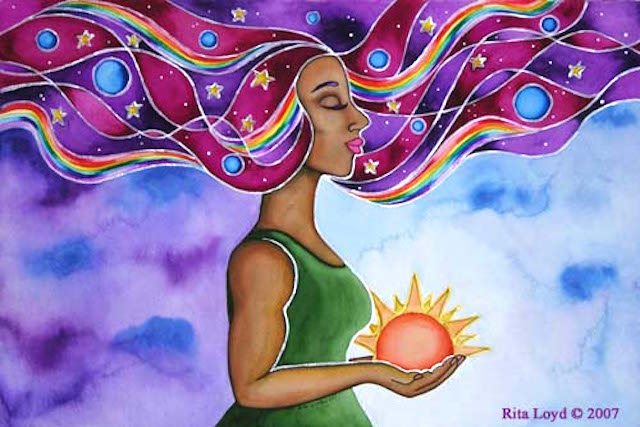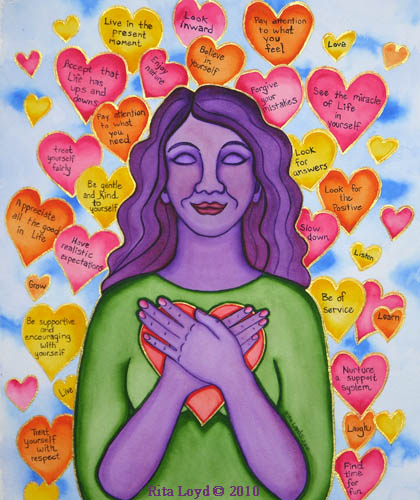
“Loving people live in a loving world. Hostile people live in a hostile world. Same world. ~Wayne Dyer
Driving home from another visit to the pediatrician, Mother reiterated how puny I was: “You’re just like Mommy. She was so frail. You get sick easily.” I’d say I was five years old when I wholeheartedly accepted this hogwash as fact. I’m not exaggerating when I tell you I stayed sick for three decades because I truly believed I was prone to illness.
I come from a long line of women who never got what they wanted. They settled, conformed, and were submissive to their male spouses. I recall when I was probably eight and witnessed a heated knock-down drag-out between my parents.
Those fights used to scare me, and I always ended up resenting my father because my mother was no match for him physically or intellectually. As she cleaned up the black mascara that had bled underneath her eyes, she told me something that ended up shaping my relationships with men.
“Paula, if you care about a man, he’ll treat you like dirt beneath his feet.”
And just like that, my perspective of men and where I stood with them was ill-fated. My teenage and adult relationships with men mirrored that belief that I accepted as fact when I was still getting bad perms. The bad perms were evidential proof that my brain wasn’t fully developed, so I was far too young to accept any beliefs as facts.
Let’s flash forward a few years to when my father decided he was too much of a man for one woman. I was eighteen when my parents divorced. Two new women entered and filled our shoes one week after Mother and I left the brick-and-mortar institution we had called home.
My father had taken on a girlfriend who had a daughter. The daughter set up shop in my bedroom and quickly adapted to answering to my nickname, “Little One.” I felt like I had been replaced because I had been. Very brutally and in true narcissistic form.
At eighteen, I wasn’t equipped with the emotional intelligence of Mother Teresa, so I blamed myself for not being lovable, a subconscious belief that controlled my behaviors for the next twelve to thirteen years.
During that time, I went from a size six to sixteen, bought property in Hell on Earth, and dated a drug-addicted criminal with multiple personalities, a mentally ill redneck who self-medicated, and a sex-addicted politician who had five out of the nine defining narcissistic traits. Believing I was unlovable created a string of unlovable experiences.
At thirty, I realized I had experienced more heartache than love, and I was sick of living a life that wasn’t worth living.
A couple of years prior, I was introduced to Dr. Wayne Dyer and was evaluating why my life looked the way it did. One day, I heard Dr. Dyer say something that changed the trajectory of my life: “Loving people live in a loving world. Hostile people live in a hostile world. Same world.”
Holy shit. That’s when I put two and two together and realized I had been a victim of a downbringing, but that didn’t mean I had to stay a victim. Downbringing is a word I created to describe a socialization that taught me how to live in havoc instead of happiness.
You might be wondering, “Well, Paula, what defines a downbringing versus an upbringing?”
A downbringing happens when a young person accepts the subjective opinions (aka lies) of the people who influence them most without questioning or awareness of what is actually true (aka objective). In turn, the subjective beliefs creep into their subconscious minds and control their behaviors before they even realize what has happened. After many years, their mind is like a landfill because they have allowed any thought to live there rent-free.
Using myself to demonstrate what a downbringing does to the mind, here is an overview of my belief systems during the first three decades of my life:
- Women getting abused by men was normal.
- Backstabbing friends and family members was normal.
- Anyone who looked different than me was of lesser importance.
- People are born lucky or unlucky, and no one has control over that.
- I was more susceptible to sickness than others, and there wasn’t anything I could do about that.
- Drinking excessive amounts of alcohol was normal.
- There was one way to make money, so I had to take any job I could find, whether I liked it or not.
- Women aren’t capable of making as much money as men.
- Everyone was better than me.
- It was wrong to want more. Wanting more meant I was a stuck-up snob.
- Jealousy is a healthy response to anyone who looks better or has more.
- Anger is totally acceptable in any situation when someone presents opposing beliefs.
- The amount of money someone has makes them superior, and they earn the right to control people who have fewer material assets.
I can keep going, but I think this list is the perfect Polaroid. Notice that what I stated about wanting more meant I was a stuck-up snob. There was something that was said to me repeatedly when I was still getting bad perms and on up until I was in my thirties.
Whenever I mentioned wanting a better life, I was told I was getting above my raising. If I mentioned admiring someone who was wealthy, highly educated, or beautiful, I was quickly shot down with that statement, usually with a belly laugh from the person who said it.
Have you ever been around someone who always found a way to humiliate the living daylights out of you? I have. I was raised by a man who used humiliation as a disciplinary tool, and he loved to pull that tool out of his pocket and use it strategically, especially when he had an audience.
For many years, I stopped vocalizing my big dreams out of fear that he would embarrass me with a cruel, disempowering lie (aka subjective opinion), but one day, I responded differently to his humiliation tactics. This was a few years into my personal growth evolution, and I had figured out the key to living the best life possible. I wasn’t quite there yet, but I had figured it out and was heading toward a better life at the speed of an Amtrak train.
He was intimidated by that because he could no longer intimidate me. On this day, he told me I was getting above my raising, and I loudly said, “God, I hope so.” His eyes got as big as two cannonballs, and at that moment, I transitioned from a thought slob to a thought snob.
As I write this article, I am forty-seven. I have spent the last twenty years living the opposite of how I was taught to live. And guess what?
I’m not frail at all. As a matter of fact, not only am I in optimal health, but I am also asymptomatic from a rare bladder condition called interstitial cystitis that is supposedly incurable. There’s more.
My husband is the kindest, most supportive person I’ve ever known. I walked away from an employer who wanted to own my soul for a couple of bucks and thrived in my female-owned business. As it turns out, the people I was jealous of ended up being my greatest teachers because it was those people that I admired.
If I continued behaving like a thought slob, accepting everyone’s opinions as absolute truths, something irreversible would have happened. This inner knowing caused me to pivot from my long, fruitful career in fundraising to helping people overcome a downbringing. While I worked to figure out this career change, I reflected on my past, and the core memories that surfaced made me realize two things.
1. Young Paula’s mindset was rooted in self-loathing, and that blocked the better life I wanted.
2. My self-loathing was the outcome of accepting the subjective opinions of others as facts.
“Whoa,” I thought. “How simple yet so complex.”
When I analyzed every aspect of my past existence, one word came to mind: slob. Physically speaking, I didn’t look like the stereotypical definition of a slob because I was very well put together and had excellent personal hygiene; however, I had neglected my brain hygiene for almost thirty years. It was corroded with filthy thoughts that nearly destroyed my life.
“So, if I used to be a slob, what am I now?” As I thought through that, I came to the conclusion that what I had always wanted was better, but instead, I chose self-loathing because of how I viewed the world and my role in it. My newfound awareness led to the creation of two acronyms:
- SLOB – Self-Loathing Overrides Better
- SNOB – See New Objective Beliefs
BAM! There it was—the perfect way to describe my transformation—from Thought Slob to Thought Snob. I had officially gotten above my raising.
Awareness is the foundation of all change. When I started behaving with mindful awareness, I was able to interrupt thoughts that would turn into some crazy, scary story.
Here is an example of how I used my Thought Snob method to reprogram my subconscious mind and train my brain to migrate away from negativity bias and toward thoughts and feelings that lifted me up instead of bringing me down.
Before I met my husband, I had been alone for quite some time, healing from the tormented relationships I had tolerated and endured. During that time, I thought about what I had been taught as a child. Caring about a man is equated to being treated poorly.
My awakening came from asking one question: Is this true? Always? Do all men treat women badly? Are all women punished for loving a man? The answer to all of these questions was a hard “NO!”
I am telling you the moment I started viewing my life objectively (aka, looking at the facts), everything changed. I moved out of the hostile world I had always lived in into a loving world and sold that property I bought in Hell on Earth. I became so snobby with what I allowed my five senses to take in that I let go of 90% of the people, places, and things that had once helped create my identity.
Bye, Felicia.
Start here if your life isn’t how you want it to be. Examine your beliefs about the most important things to you. For demonstrative purposes only, let’s use money. If you’re broke and you desire wealth, what are your beliefs about money?
Let’s say you discovered that you don’t believe you are capable of obtaining wealth because you were taught to believe that money was hard to come by. As you self-reflect, you find yourself feeling resentment toward wealthy people because you grew up in a household where people badmouthed the wealthy.
Now, use SNOB and answer those questions objectively. For example, was it hard to come by when you received money for your birthday? No, it was easy.
Are all wealthy people bad? No, they aren’t. The truth is, there are some wonderful wealthy people, and resentment comes from wanting what they have.
Building self-awareness leads to asking self-reflection questions, and the answers that come reveal the culprit. The culprit is the lies you accepted as truths before your brain was fully developed. Those lies have controlled your behaviors, but here’s the good news.
You’re an infinite choice-maker. At any moment, you can choose peace or hostility. That’s a fact.
Here’s what I want you to do: Start practicing mindful awareness. Examine your whole life through an objective lens. When you see new objective beliefs, your self-loathing will no longer override better.
Examine your life without judgment. You know where your beliefs came from. Show yourself tremendous compassion and move forward mindfully with a desire to change.
![]()
About Paula Swope
Paula Swope is a spiritual coach, podcast host, Deepak Chopra Certified Instructor and author of Thought Snob: The Modern Spiritual Playbook for a Better Life. After years of trauma, abuse, and self-destruction, Paula realized negative thinking patterns were failing her and began a transformation. Her ‘Thought S.N.O.B.’ process teaches how to move from havoc to happiness and create the life you deserve through the amazing power of your thoughts—just as she did. Follow her on Instagram, TikTok or Facebook.
Get in the conversation! Click here to leave a comment on the site.
from Tiny Buddha https://ift.tt/9FCOkUd








